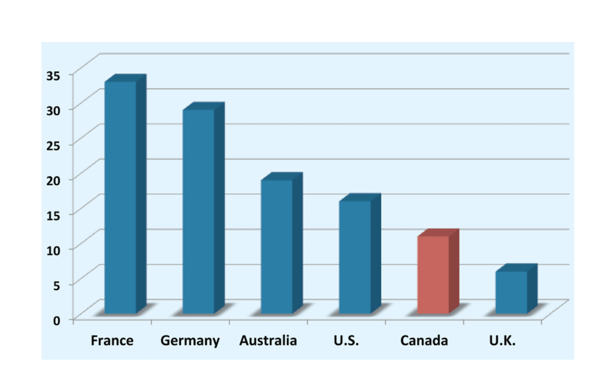A “carefully crafted and adequately funded” strategy to more than double the number of Canadian students abroad has been proposed in a report released by the University of Ottawa’s Centre for International Policy Studies and the University of Toronto’s Munk School of Global Affairs.
News and business analysis for Professionals in International Education
Have some pie!
Outbound mobility “vital tool” for Canada’s future
 Canada sits ahead of only the UK in proportion of post-secondary students abroad. Photo: CIPS & Munk School of Global Affairs
Canada sits ahead of only the UK in proportion of post-secondary students abroad. Photo: CIPS & Munk School of Global Affairs The Global Education for Canadians report, which compares the outbound mobility of students from major destinations as part of their undergraduate program, found Canada sat ahead of only the UK, with 11% of its domestic students going overseas.
“We have long been advocating for a national call to action to address Canada’s global engagement challenge”
Without action, the report argued, the current level of students going abroad threatens to push Canada further behind other countries, with fewer citizens having international experiences and connections, leaving it unprepared for future challenges.
“If we fail to act, these nations rather than ours will produce the next generation of leaders across all sectors,” it noted, adding, “[study abroad] must be seen as a vital tool to equip young Canadians from all walks of life for success.
“Their future, and Canada’s future, depends on it.”
Among the challenges identified, the report highlighted changes to the nature of work, such as increased automation and a higher need for soft skills; a shift in the purchasing power of developing economies over established economies; and increasing levels of intolerance.
“We need [our students] to help Canada in many ways,” the report said.
“By building global networks and relationships that will strengthen Canada’s voice and influence in the world; by expanding Canada’s knowledge and reach in new, fast-growing markets; by succeeding as workers and entrepreneurs in a changing workplace and economy; and by becoming champions of diversity and inclusion at home and abroad.”
To counteract these challenges, the report recommended a national strategy with goals including more than doubling the current percentage of Canadian students abroad to a quarter of all post-secondary over 10 years, and an increase to the numbers of students studying in emerging countries.
To promote these goals, the report outlined a national initiative, Go Global Canada, to support 15,000 students to study abroad per year over five years, with an ambition to double to 30,000 within 10, as well as a reduction in institutional barriers and the establishment of a national system to collect and compare study abroad data.
“[Study abroad] must be seen as a vital tool to equip young Canadians from all walks of life for success”
Additionally, half of all Go Global Canada participants should attend study in emerging markets, the report recommended, with significant language and culture support, and tailored programs to boost participation by students within lower income and underrepresented groups.
Canadian Bureau for International Education chief executive Karen McBride said the report backed up the findings of a 2016 survey which survey as the catalyst for the #LearningAbroad campaign earlier this year.
“We have long been advocating for a national call to action to address Canada’s global engagement challenge, that of getting more of our students to engage in a learning abroad experience,” Canadian Bureau for International Education chief executive Karen McBride said in a statement.
“We welcome these new voices added to the call to make learning abroad a reality for a critical mass of young Canadians, particularly those who would not otherwise have the opportunity.”
Outward mobility has made headlines recently, with a US report finding 11 out of 15 “21st century workplace skills” were gained through an experience overseas, and UUKI launching a campaign to double domestic students’ participation abroad.
Still looking? Find by category:


